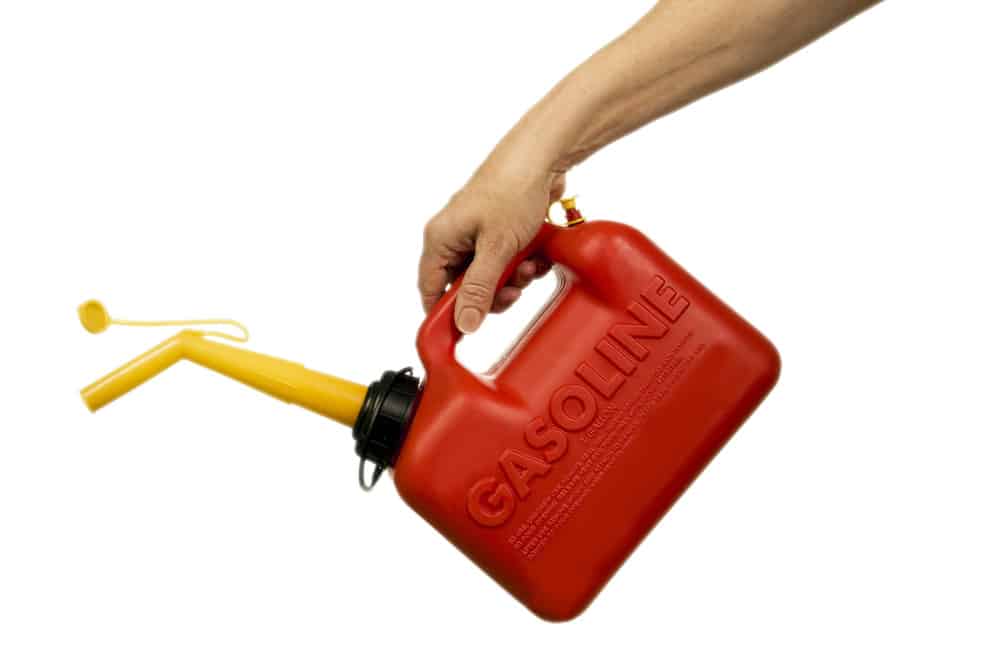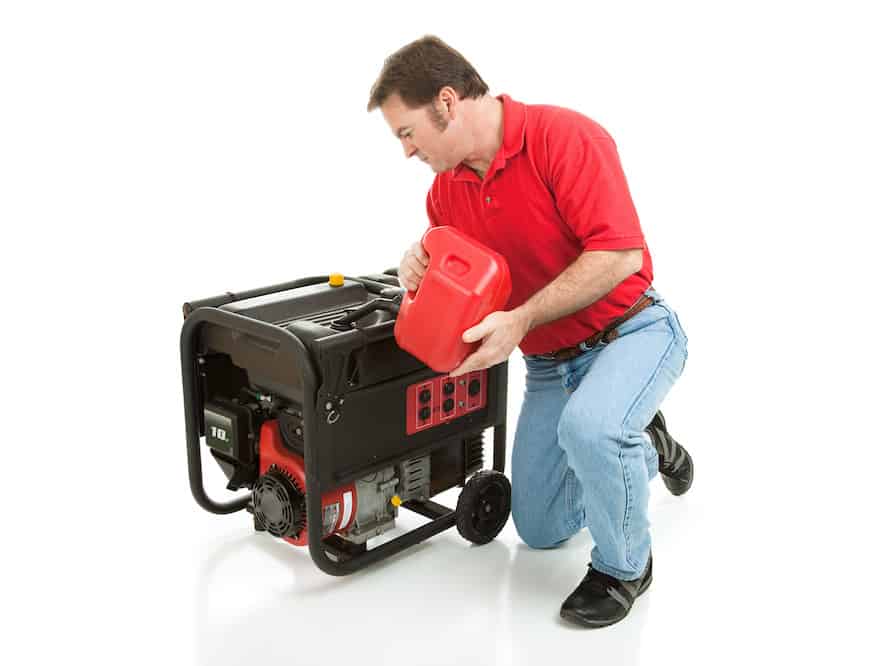Are you wondering how much gas does a generator use? For homeowners and RV owners alike, this is one of the most common questions. It is important to consider fuel consumption rates and costs when planning to opt for an alternative source of power.
How Much Gas Does a Generator Use?
How much gas does a generator consume depends on several factors. These include the type of generator you have, fuel type, and the load. All of these influence how much gas your generator needs to run.
Moreover, the efficiency of the generator’s engine also plays a significant role in determining its fuel consumption. More efficient engines will use less fuel to produce the same amount of power.
What Affects Generator Gas Consumption Rates?
1. Generator Type
The type of generator you choose will give you a relative answer to how much gas does a generator use per hour. As different designs require differing fuels, you’ll want a model that allows you to manage your load and consumption.
The most popular types of generators include:
Standby
The primary responsibility of standby generators is to make sure you’re safe in emergencies.
If you live near inclement weather, investing in a standby generator can be quite beneficial. Typically, it packs a punch so powerful that it can power your entire home for several consecutive hours.
Due to its large size, though, it is bound to consume plenty of gas as it deals with significant loads.
Standby generators often come with automatic transfer switches that seamlessly switch the power source from the grid to the generator during outages, enhancing their convenience.
Portable
You’ve likely considered portable generators if you like traveling because they’re compact, convenient, and easy to use. Depending on the size of the generator you choose, they can handle tasks as little as laptop charging or as large as powering appliances.
The Fuel Tank Capacity indicates how much fuel the tank holds. A large capacity tank allows the generator to run longer without refueling.
However, most homes won’t be able to rely on portable generators because they can only power a few items at once.
People also like using portable generators for outdoor events like camping and tailgating, where their mobility and ease of use are huge assets.
Inverter
An inverter generator is the smallest option and is best left for powering your electronics.
Typically, these units can be pre-charged using electricity rather than requiring gas or other types of fuel. Inverter generators are particularly valued for their quiet operation and clean power output, which is safer for sensitive electronic devices.
Power Inverters vs Generators which is best
Tri-Fuel
If you want the most versatility when it comes to having a generator, a tri-fuel model is your best bet. Like its name suggests, these generators allow you to work with natural gas, liquid propane, or gasoline as your fuel.
You can also find kits to help you convert your existing gas-powered generator to a tri-fuel one.
The flexibility of tri-fuel generators means you can switch between fuel types based on availability or cost, offering unmatched operational versatility.
Dual fuel generators are another option.
2. Fuel Type
The fuel type of the generator you choose has a significant bearing on the amount of fuel used, as some burns faster than others.
Diesel
If you want the most efficient burn, diesel is an excellent option. This is because it burns slower than any other fuel type.
Diesel generators are also known for their durability and long lifespan, making them a cost-effective option for continuous use. Diesel has an impressive fuel consumption chart to consider.
| Generator Size (kW) | Full Load (Gallons/hr) |
| 1000 | 71.1 |
| 1500 | 106.5 |
| 2000 | 141.9 |
| 2250 | 159.6 |
However, there are many environmental issues about diesel, such as higher emissions. You might find that specific diesel generators will burn dirty, putting harmful toxins into the air.
Natural Gas
Natural gas generators are often chosen for their convenience in areas with existing gas infrastructure, eliminating the need for fuel storage.
Natural gas can be seen as a cleaner alternative to diesel, but it’s not the most eco-friendly option. One of the primary reasons to consider natural gas generators is if you have natural gas lines in your home. Without these lines, it would be impossible to connect the generator as a backup power source.
Another issue with natural gas is that it burns fuel at an incredible rate, especially compared to diesel. A natural gas generator will use approximately:
| Generator Size (kW) | Full Load (cu.ft./hr) |
| 1000 | 9883 |
| 1750 | 17264 |
| 2250 | 22184 |
Gasoline
Gasoline is easily one of the most available fuels, and you’re most likely to invest in one of these generators at first. When wondering how much gas does a generator use per hour, gas has a moderate number.
On average, you can expect a five-gallon gasoline generator to consume at least 0.75 gallons per hour.
They are some of the less expensive generators on the market, but they need to be refueled continuously. It’s also important to note that gas is going to be one of the hardest fuels to find in emergencies.
Also, the volatility of gasoline prices can affect the operating costs of gasoline-powered generators over time.
Propane
Propane is a highly versatile material that is easy to source, similar to gasoline. It’s a popular choice for standby generators, especially if homes don’t have natural gas lines.
More specifically, blackout-prone rural homes can benefit from having a propane generator because propane is easy to find in remote locations.
Propane is also a reliable fuel type, as these generators typically have significantly larger tanks. For example, a 500-gallon propane generator can fuel a home for a week. Most models burn up to three gallons per hour and can be as large as 1,000 gallons.
Propane’s clean burning properties and the ability to store large quantities safely make it an ideal choice for long-term or emergency use.
3. Load
The last important factor to consider in regards to fuel consumption is the load. The load is the number of appliances you have connected to the generator that will drain its power.
A light load would be personal electronics, while a heavy one would be a whole house. It’s important to think about what you want to be able to run if there is a power outage.
Carefully assessing your needs and plan accordingly so you select a generator that meets your requirements without overspending on unnecessary capacity.
When you look at generator advertisements, you’ll notice that they typically provide data based on a 50% load.
If you know you’ll be using more than 50% of its available power, consider its consumption with a 100% load.
Be sure you have enough gas to power the generator.
Understanding the relationship between load and fuel consumption is critical for efficient generator use, ensuring you have enough fuel to cover your needs during an outage.

How Much Gas Does a Generator Use Per Hour?
The amount of gas your generator consumes hourly depends significantly on the fuel type and load. If your generator is trying to power multiple appliances, it’s bound to run out of gas quickly.
As mentioned, the average five-kilowatt generator can consume 0.75 gallons of gas per hour if you’re running survival equipment.
If you choose a larger unit, such as a 30-kilowatt design, it can consume up to three gallons per hour on a full load.
This highlights the importance of selecting a generator with the appropriate power output for your needs to avoid excessive fuel consumption.
Using a fuel consumption chart or calculator can help you determine the consumption rates for your specific model.
How Much Gas Does a Generator Use in a Day?
Using the figures listed above, how much gas does a generator use in a day? With a five-kilowatt generator consuming 0.75 gallons per hour, you’ll consume up to 18 gallons of gas per day.
However, it’s important to note that these calculations are for essential survival appliances. With these calculations, you can expect to pay up to $53 per day to run a generator for essentials.
Planning for fuel needs based on your generator’s consumption rate is essential for budgeting during extended power outages.
How Long Will a Generator Run on 5 Gallons of Gas?
It is easy to wonder how long will a generator run on 5 gallons of gas, especially as most models are five gallons. With a fuel consumption rate of 0.75 gallons per hour, you can expect a five-gallon generator to run for seven consecutive hours.
This calculation is VERY IMPORTANT for understanding how often you’ll need to refuel your generator, especially during prolonged use.
Which Fuel Type Is Best?
Diesel is the top choice if you want a slow-burning fuel that provides plenty of power. However, natural gas can also be a good option if you have hookups near your home.
Alternatively, propane isn’t consumed too quickly and will have a significant fuel tank for extended power. For that reason, you may want to consider a propane generator.
See related:

